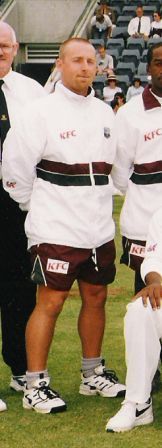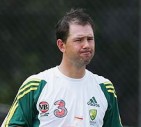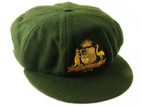Julien Fountain Interview
Zac Gelman |
Renowned fielding coach Julien Fountain, rated by Spin magazine as one of the best fielding coaches in the world, recently spoke to CricketWeb, answering questions posed by the active community within the CricketWeb forums.
Julian has a collection of cricket memorabillia that he has collected from around the cricketing world which include a wide range of used clothing and equipment.
Check out all that he has for sale at www.stripskitandcollectables.com
Don’t miss out on some fantastic products!
Question: What is the best method for a fast bowler to attempt to field in the extremely stiff period after a long spell? Should he be hidden in the field? Keep very low to look to pick up the ball? Dive around to avoid a long chase after the ball? Etc.
Manee
Answer:
The debate about fast bowlers and fielding has been raging for years. I feel that they have tended to be pigeonholed as not being able to field and have consequently been neglected. The game has changed almost beyond recognition in recent times and fielding is more important now than ever before, and the advice is the same to fast bowlers as to all players “keep your mind and body alert and ready to execute any skill, at any distance at any time. Switch off at your peril!”
Question: What is the big difference between being the fielding coach of a cricket team and that of a baseball team?
biased indian
Answer:
Apart from the difference in skills and tactics, they are fairly similar. The main difference being that in baseball fielding statistics are widely available and form criteria for selection. If you mess up it goes on the scoreboard and on your averages. This gives greater incentive to execute the right skills correctly.
Question: What do you get out of being a coach? What fulfillment?
roseboy64
Answer:
I enjoy both ends of the spectrum. Coaching kids and seeing the difference I can make and teaching pros who think they know everything but don’t.
Question: What differences did you experience in the different countries as it relates to facilities, players, management and resources?
roseboy64
Answer:
Well that’s a no-brainer! Having worked with and in Pakistan, West Indies and England I have see a huge array of good and bad both in facility, attitude and organisation. Where one is good in certain aspects, it might be bad in others. It usually evens itself out overall though.
Question: How has the role of players’ fitness changed throughout the history of cricket? How different is the standard from 20 years ago, or from 50 years ago?
Athlai
Answer:
Fitness is an area which has changed along with society and its expectations of players. The more professional the sport has become, the more attitudes to training have had to improve. With millions of dollars at stake now, you can bet that players will be happier to stay in the gym for longer.
Question: Do you think that a cricketer is more likely to be successful if he has natural ability or has mental strength?
HeathDavisSpeed
Answer:
As with any sport there has to be a good mix of all criteria. Natural ability is crucial but that is not enough at the top end, as there are lots of naturally talented players. What makes a difference is the combination of mental strength, physical attributes, technical ability and some good old-fashioned luck.
Question: Which individual player that you have coached do you feel that you have had the most positive effect on, and what in particular do you think you have helped him with?
HeathDavisSpeed
Answer:
I have been fortunate enough to work with some of the world’s leading cricketers, so it is hard to narrow it down. I like to view it in terms of overall team change, such as West Indies’ tour of England 2007 where they were poor in the field during the Tests, but I joined them after the first Test at Lord’s and by the Twenty20 and ODI series’ they had achieved quite a good standard of results in the field.
Question: If you could give one piece of advice to a youngster looking to take up cricket, what would it be?
HeathDavisSpeed
Answer:
Enjoy it every day, as there is no point competing if you don’t enjoy the competition.
Question: There is a lot of talk in the media about 20:20 harming players’ technique, and for batsmen in particular. What are your views on this?
HeathDavisSpeed
Answer:
I have witnessed a huge change in approach to this format of the game since it started. It was originally a huge slog where technique seemed to suffer. Now you will see that the batters who succeed are able to combine traditional skills and values with power and adaptability. Batters have had to work on putting the ball into gaps using quite unorthodox methods, but they have to be able to do the basics as well.
Question: How do you measure your success or failure as a coach? Does team success or individual players having success give you more pride?
HeathDavisSpeed
Answer:
I like to be able to measure my success with cold hard statistics. Catches vs. drops, errors, assists, run outs etc. Sometimes my department can improve dramatically (West Indies? 2000/2001 tour of Australia) but still lose the games. I take some comfort in being able to make an improvement in my area but wish that the decision makers in suits could differentiate between departments.
Question: What do you think the key tools are that a coach has to have at his disposal in order to be successful?
HeathDavisSpeed
Answer:
Enthusiasm and passion for the sport combined with some organizational skills. You have to love what you do but learn to improve your delivery of the sessions.
Question: What really, really irritates you?
HeathDavisSpeed
Answer:
Nepotism and favouritism in elite cricket.
Question: If you were given control over the Laws of Cricket, would there be anything that you would like to change and why would you change it?
HeathDavisSpeed
Answer:
Introduce fielding into official statistics package.
Question: What is the most tricky situation you’ve found yourself in as a coach?
HeathDavisSpeed
Answer:
The Oval 2006, Pakistan vs. England Test match. It was surreal.
Question: What different problems does coaching in different countries cause – i.e. does coaching in Pakistan present different challenges to coaching in the West Indies, and if so what tangible differences are there?
HeathDavisSpeed
Answer:
As mentioned earlier each country has differing challenges, sometimes facility sometimes organisation sometimes attitude. Each has its benefits, each has its pitfalls. Coaching in the Caribbean is wonderful, but so is coaching in Pakistan. Its how you approach it and what you want to get out of it that makes or breaks you.
Question: What challenges face coaches like Geoff Lawson and Jamie Siddons who have to manage players from different backgrounds to what they’re familiar with?
James90
Answer:
Any successful coach will tell you it’s about managing people and their differences. With some they need a friend and a shoulder to cry on; others need to be shouted at. Differing cultures also mean differing approaches. Coaching a group of Australians needs different skills to coaching a group of West Indian or Pakistani players. Cultural differences do play an important part.
Question: From working with a vast array of teams can you easily identify trends between attitude to training and results?
James90
Answer:
Attitudes vary team by team but never underestimate the power of senior players to influence both junior players and administrators alike.
Question: Do you ever think the workload of a player is too much?
James90
Answer:
Cricket is unique in that it is the only game which can last for days at a time and still not achieve a result! Players are dictated to by their own boards because of television rights, so money is the key factor. However now that Twenty20 has seen big salaries paid for small commitments, you might see a change around in the formats as players take a little more control over where they can earn a good living.
Question: Who is the best fielder you have worked with and who is the worst fielder you have worked with?
Shaggy Alfresco
Answer:
Tough one to answer as I have worked with such a huge number. In terms of ability, commitment and attitude to playing and training, Jimmy Adams must be right up there.
Question: What has been the best coaching job/experience you have had and why? It doesn’t need to be results based either.
Craig
Answer:
Summer 2007 saw me selected as the head coach of the England Under-16 team, and we beat Australia Under-16 in a series of 7 games 7-0. I am quite chuffed at that!
Question: Who is the best fielder you have ever seen in international cricket in terms of ability and technique? And is the best in the world right now?
Craig
Answer:
Obvious names jump out such as Jonty (Rhodes), Herschelle (Gibbs), Colly (Paul Collingwood), Jimmy Adams but because there are no official statistics on fielding nobody can stand up and produce evidence to prove this. This is why fielding scoring should be introduced. I do it with the teams I work with, but its never quoted in official statistics. Shame!
Question: What made you take up coaching?
Craig
Answer:
I love sport and love helping people (cheesy I know but its true!)
Question: Which player and team has been your biggest success story so far? For example a player and a team might be quite poor in the field, yet with hard work they have turned it around.
Craig
Answer:
All the International teams I have been involved with have improved over a relatively short period of time, however because of the short sightedness of various people I have not had the chance to remain en-situ with a team for any great length of time to really see a proper progression.
Question: Who was your mentor in cricket and baseball?
Craig
Answer:
My cricket mentor is Gordon Lord ex Warwickshire, Worcestershire and ECB Elite Coach Education Manager. He got me into cricket coaching and has remained a life long friend and sounding post.
Question: What was your first love – cricket or baseball? Or both? And what was your family background as well?
Craig
Answer:
First love was cricket. Dad was a cricketer and I played in the Somerset organisation as a kid, but left them at 18 to take up baseball. Love all sports, watching and competing.
Question: What are your interests outside of cricket? For example, your favourite music, movie etc.
Craig
Answer:
All sports, especially ocean-based sports such as scuba, free diving and surfing. Love hockey, which is incidentally a really good winter sport to improve cricket both in a fitness and skills aspect. Favourite film too many but any by the director Luc Besson (Big Blue, Leon, Fifth Element etc) Music tends to vary depending upon mood but am always partial to some good old fashioned Rave (Prodigy, Shamen, Utah Saints, etc.)
Question: If your county was struggling for numbers and you were forced to take the field how do you think you would handle it?
NUFAN
Answer:
I have already had to prove this a number of times, having fielded for West Indies vs. the Australian Prime Minister’s XI 2000/01 (check Wisden for a run out I got!); West Indies vs. Australia A 2000/01; West Indies vs. MCC 2007; and a few others besides! (No Pressure Coach!!!)
Question: Sometimes you have to work with cricketers who have a reputation for being difficult. What techniques do you use to ensure that you get results?
armchairumpire
Answer:
Deal with people, not reputations.
Question: The media often is very critical of coaches. It seems that if the team does well then it is the great players in the team, and if the team does badly it the fault of the coach. What keeps you going when the team is not winning games?
armchairumpire
Answer:
Love of the game and the will to improve things. It is difficult especially when you are not being assisted by influential people who should know better.
Question: How much of a person’s fielding skills can be acquired through coaching and how much of it is plain natural ability?
honestbharani
Answer:
50/50. There is always room for improvement, but there has to be some natural attributes in there somewhere.
Question: Is it honestly possible to get a guy to throw the ball faster or run across the field faster through training alone?
honestbharani
Answer:
Training and coaching play a role, but the individual has to commit to the process.
Question: Of all the players you have worked with who was the most difficult to handle with?
biased indian
Answer:
No Comment!
Question: What kind of fielding drills or scenarios should I be coaching my Under-10 and Under-12 teams to give them the best chance to be excellent fielders as they develop?
Mr. Wright
Answer:
A good variety of single skill drills, followed by overload drills and multi skill drills. Make sure the skills are practiced before an all bells and whistles drill though.
Julien Fountain has worked with many cricketing organisations in recent times including the Pakistan, England and West Indies cricket teams.



Leave a comment